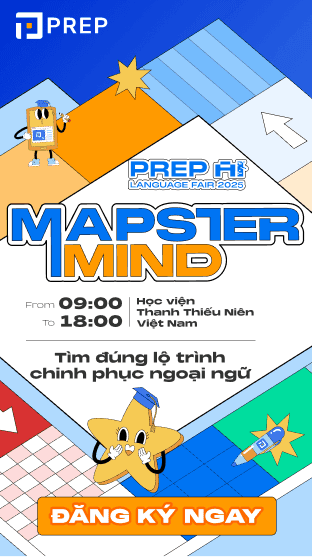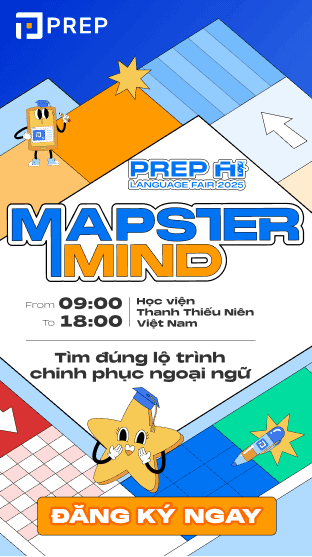Hướng dẫn học tiếng Anh 9 Unit 6: Vietnamese lifestyle: Then and Now
Tiếng Anh 9 Unit 6 trong sách Global Success thuộc chủ đề Vietnamese lifestyle: Then and Now. Cùng PREP tìm hiểu ngay dưới đây cấu trúc bài học, nội dung kiến thức và hoàn thành phần bài tập có đáp án đính kèm bạn nhé!

I. Giới thiệu về Unit 6 tiếng Anh 9
Trước khi học tiếng Anh 9 Unit 6, hãy cùng PREP điểm danh qua phần “Book Map” ngay dưới đây bạn nhé!
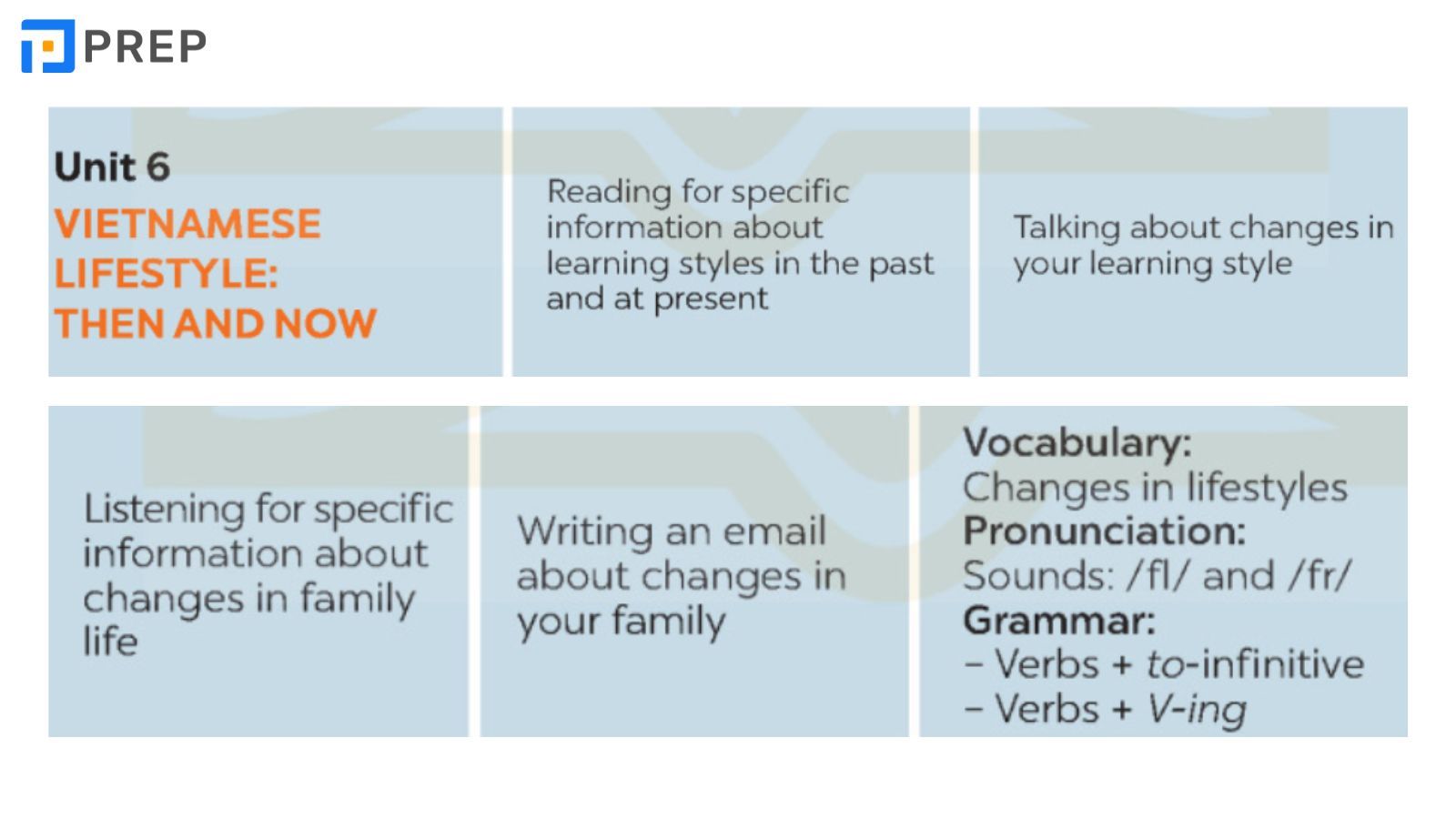
|
Kiến thức |
Nội dung |
|
Reading |
|
|
Speaking |
|
|
Listening |
|
|
Writing |
|
|
Language Focus |
|
Tham khảo thêm bài viết:
II. Từ vựng, ngữ pháp, phát âm trọng tâm trong Unit 6 tiếng Anh 9
Cùng PREP điểm qua kiến thức về từ vựng, ngữ pháp, phát âm trọng tâm trong Unit 6 tiếng Anh 9 dưới đây nhé!
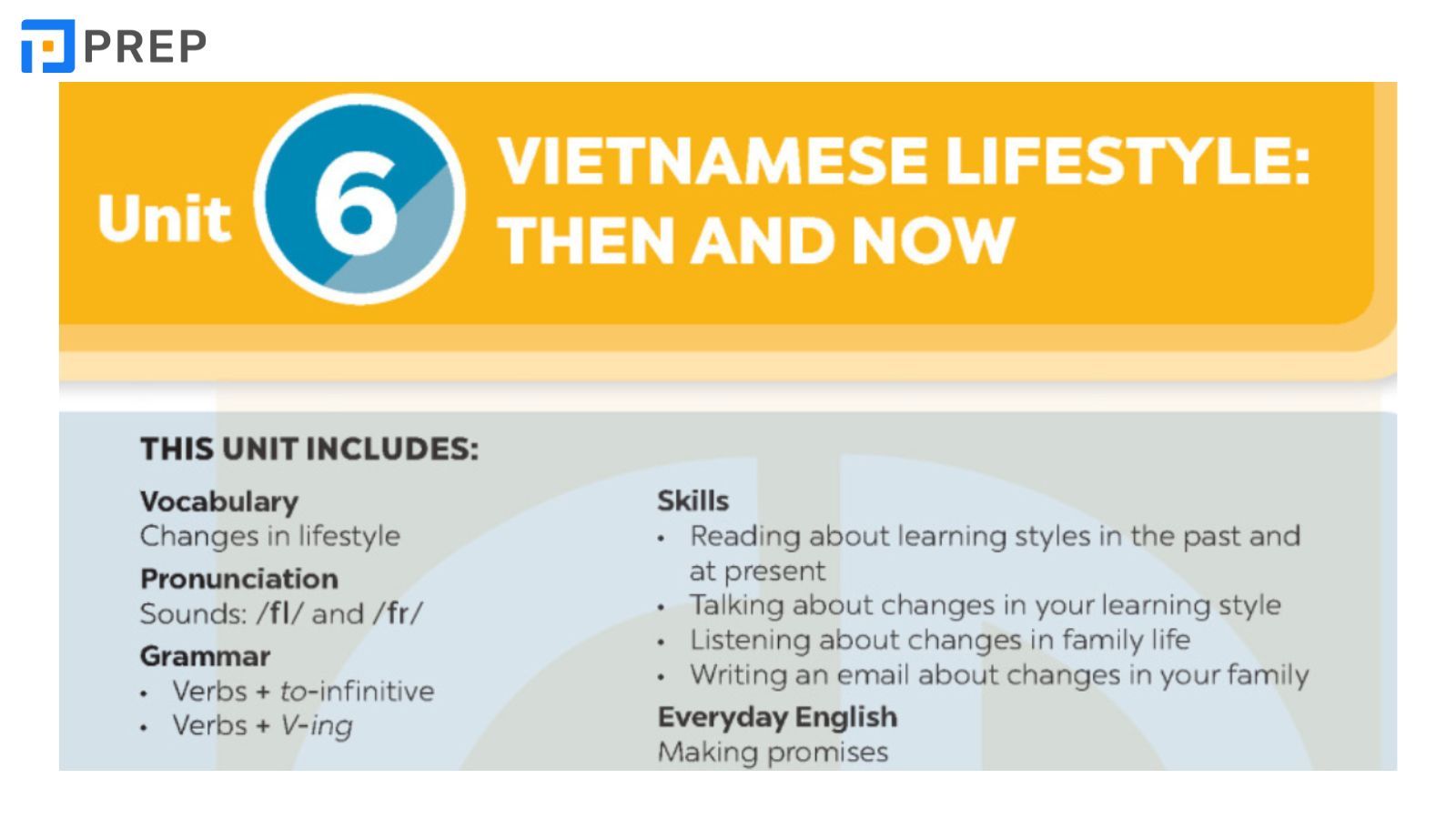
1. Từ vựng
|
Từ vựng |
Phiên âm |
Dịch nghĩa |
|
democratic (adj) |
/ˌdeməˈkrætɪk/ |
thuộc dân chủ |
|
dependent (adj) |
/dɪˈpendənt/ |
lệ thuộc vào |
|
dye (v) |
/daɪ/ |
nhuộm |
|
extended (adj) |
/ɪkˈstendɪd/ |
nhiều thế hệ (trong một gia đình) |
|
family-oriented (adj) |
/ˈfæməli ˈɔrientɪd/ |
hướng về, coi trọng gia đình |
|
gap (n) |
/ɡæp/ |
khoảng cách |
|
generation (n) |
/ˌdʒenəˈreɪʃn/ |
thế hệ |
|
household (n) |
/ˈhaʊshəʊld/ |
hộ gia đình |
|
lifestyle (n) |
/ˈlaɪfstaɪl/ |
lối sống |
|
memorise (v) |
/ˈmeməraɪz/ |
ghi nhớ |
|
monk (n) |
/mʌŋk/ |
nhà sư |
|
nuclear (adj) |
/ˈnjuːkliə/ |
hai thế hệ (trong một gia đình) |
|
opportunity (n) |
/ˌɒpəˈtjuːnəti/ |
cơ hội |
|
popularity (n) |
/ˌpɒpjuˈlærəti/ |
sự phổ biến |
|
privacy (n) |
/ˈprɪvəsi/ |
sự riêng tư |
|
promise (n, v) |
/ˈprɒmɪs/ |
lời hứa, hứa |
|
pursue (v) |
/pəˈsjuː/ |
theo đuổi |
|
replace (v) |
/rɪˈpleɪs/ |
thay thế |
|
take notes |
/teɪk nəʊts/ |
ghi chép |
|
trend (n) |
/trend/ |
xu hướng |
|
western (adj) |
/ˈwestən/ |
thuộc phương Tây |
2. Ngữ pháp
1. Cấu trúc V + to V
Cấu trúc V + to V được dùng để thể hiện mục đích, hành động xảy ra trong tương lai hoặc một kế hoạch. Ví dụ:
-
I want to study English. (Tôi muốn học tiếng Anh.)
-
Xavia plans to visit her grandparents. (Xavia dự định thăm ông bà.)
2. Cấu trúc V + V-ing
Cấu trúc V + V-ing được dùng để nói về hành động đã xảy ra, thói quen hoặc việc yêu thích/không thích. Ví dụ:
-
They suggested going to the cinema. (Họ đã gợi ý đi xem phim.)
-
Jack admitted breaking the vase. (Jack thừa nhận đã làm vỡ bình hoa.)
Để hiểu thêm về cách sử dụng to V và V-ing cũng như phân biệt được 2 cấu trúc này, tham khảo bài viết “To V và Ving là gì? Cách dùng To V và Ving trong tiếng Anh” dưới đây bạn nhé!
3. Phát âm
|
/fl/ |
Fly /flaɪ/: bay |
|
|
/fr/ |
Friend /frend/: bạn |
III. Cấu trúc bài học Unit 6 tiếng Anh 9
Cùng PREP điểm qua cấu trúc bài học và nội dung kiến thức có trong Unit 6 tiếng Anh 9 bạn nhé!
1. Getting started
1.1. Listen and read
Nghe và đọc:
Phong: Grandpa, do you mind telling me how our lives are different from yours in the past?
Grandpa: Well, there are many differences. In my day, we mostly played outdoors. The games were simple and cost little. We made our own toys from natural materials.
Phong: That sounds interesting. Nowadays, most leisure games depend on electronic devices.
Grandpa: Right, but that is mostly true in the city only. Many children in the countryside still play traditional games.
Phong: I know.
Grandpa: Another thing is that children nowadays have more freedom of choice. They wear short dresses and jeans with holes. They also dye their hair purple and green.
Phong: Ha ha... Not many, Grandpa.
Grandpa: Hm... And many children of my generation left school early to support their families. Moreover, there were not many schools then.
Phong: You mean we have more opportunities to learn now?
Grandpa: That's right.
Phong: Do you think these changes are for the better?
Grandpa: Yes, they mostly are. They have improved our living conditions.
Phong: Thank you, Grandpa.
1.2. Read the conversation again and circle the correct answers
Đọc lại đoạn hội thoại và khoanh tròn những câu trả lời đúng.
1. Phong and his grandpa are talking about some differences between _______.
-
A. children in the city and the countryside
-
B. the living standards in the past and now
-
C. life in the past and now
-
D. past and present entertainment
2. Phong's grandpa mentions _______ differences.
-
A. two
-
B. three
-
C. four
-
D. five
3. Phong's grandpa sees most of the changes as _______.
-
A. positive
-
B. negative
-
C. unnecessary
-
D. necessary
1.3. Write the expressions from the conversation in the correct column
Viết các câu diễn đạt trong đoạn hội thoại vào đúng cột.
|
a. depend on electronic devices b. leave school early c. dye their hair d. have more opportunities to learn e. make toys from natural materials |
|
|
The past |
The present |
|
… |
… |
1.4. Complete the sentences with the words from the box
Hoàn thành câu với các từ trong khung.
|
Opportunity; freedom; dyed; generation; materials |
1. A few teenagers in my village have _______ their hair brown.
2. Young people's lifestyle today is different from that of the previous _______.
3. Nowadays, nearly all young people have a(n) _______ to go to school.
4. He wants to live green, so he uses products made from natural _______.
5. My parents give me _______ to pursue my own interests.
1.5. Quiz
Làm việc theo cặp. Hãy cho biết những nhận định dưới đây đúng hay sai về cuộc sống ở Việt Nam 40 năm trước. Chia sẻ câu trả lời của bạn với cả lớp.
40 years ago, _______
1. school children didn't wear uniforms.
2. no Vietnamese student could go and study abroad.
3. most people wrote letters instead of writing emails or texting messages.
4. bicycles were the main means of transportation.
5. people lit firecrackers at Tet and weddings.
2. A Closer Look 1
2.1. Match the verbs or phrasal verbs with their meanings
Nối các động từ hoặc cụm động từ với nghĩa của chúng.
|
A |
B |
|
1. take notes |
a. learn something carefully so that you can remember it exactly |
|
2. depend on |
b. take the position of something/somebody |
|
3. memorise |
c. write down some key information when listening to a talk, a lecture |
|
4. pursue |
d. rely on something/ somebody |
|
5. replace |
e. try to achieve something over a period of time |
2.2. Work in pairs
Làm việc theo cặp. Thảo luận và điền vào mỗi chỗ trống một tính từ trong hộp.
|
Democratic; personal; various; extended; family-oriented |
1. Four generations live in my house: my great grandparents, my grandparents, my parents, and me. It's a(n) _______ family.
2. In our group, everybody has equal rights to speak and work. We have a(n) _______ relationship.
3. Children in the past played a lot of traditional outdoor games such as hide-and-seek, tug of war, and marbles. There were _______ outdoor games for children.
4. I don't make public my telephone number, home address, or birthday. They are my _______ information.
5. He values his family and spends a lot of time with them. He's a(n) _______ person.
2.3. Circle the correct answer A, B, C, or D to complete each sentence
Khoanh tròn vào đáp án đúng A, B, C hoặc D để hoàn thành mỗi câu.
1. Most of the events at the fair are _______, i.e. they are designed for the family.
-
A. family-oriented
-
B. exciting
-
C. democratic
-
D. various
2. In the past, girls had little opportunity to _______ their interests.
-
A. know
-
B. replace
-
C. pursue
-
D. promise
3. Hi-tech appliances used for housework have _______ our old-fashioned tools.
-
A. made
-
B. replaced
-
C. stopped
-
D. given up
4. The relationship between parents and children is now more _______ than in the past.
-
A. independent
-
B. private
-
C. democratic
-
D. extended
5. Protect your personal _______ online by using strong and unique passwords.
-
A. taste
-
B. experience
-
C. opinions
-
D. privacy
2.4. Listen and tick (✔) the words you hear
Nghe và đánh dấu (✔) những từ bạn nghe được. Hãy nghe và nhắc lại.
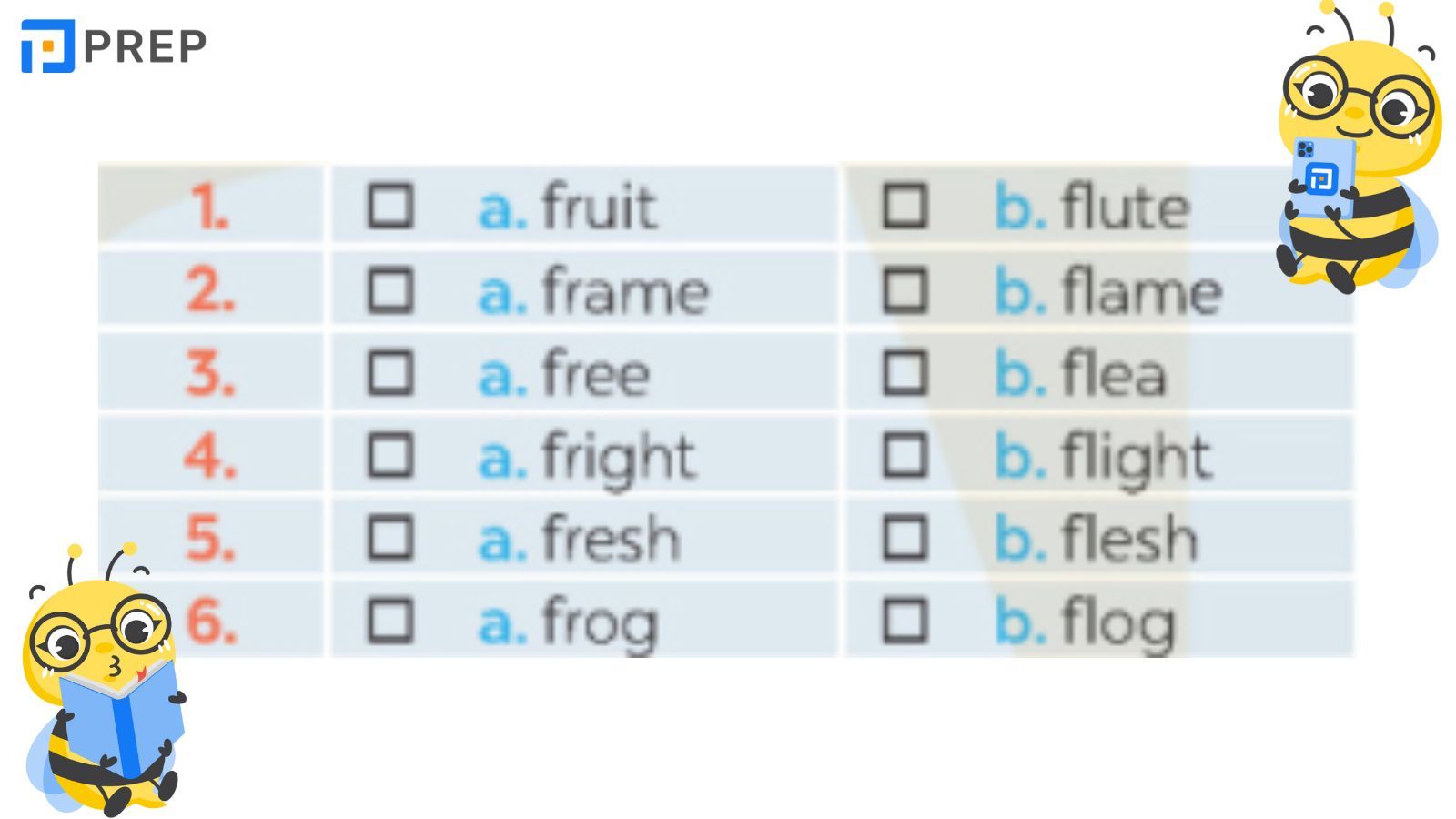
2.5. Listen and repeat the sentences
Nghe và lặp lại các câu. Hãy chú ý đến những từ được gạch chân.
1. The photos of their fight for freedom are on the second floor.
2. Who suffers most from generation conflicts?
3. The man is reflecting on his frightening trip.
4. How does the past influence your friends?
5. When I was small, I caught the flu frequently.
3. A Closer Look 2
3.1. Write the correct form of the verbs in brackets
Viết dạng đúng của động từ trong ngoặc.
1. fancy (ride) _______ a buffalo
2. learn (use) _______ traditional farming tools
3. mind (not touch) _______ the displays
4. decide (make) _______ a kite
5. avoid (play) _______ on the streets
6. promise (learn) _______ more about the history of our village
3.2. Underline the correct verb form for each sentence
Gạch dưới dạng động từ đúng cho mỗi câu.)
1. I really fancy to wear/wearing this traditional cone hat at our Fashion Show
2. My brother has decided to enter/entering the Back to Our Past Competition.
3. Do you mind to replay/replaying that folk music? It's lovely.
4. My uncle always avoids to tell/telling stories about his past.
5. They plan to do/doing research about life in Hue in the 19th century.
3.3. Complete each sentence with the correct form of a verb from the box
Hoàn thành mỗi câu với dạng đúng của động từ trong khung.
|
Make; learn; give; work; teach |
1. We want _______ how to make toys from natural materials.
2. Yesterday, we finished _______ on the poster for our Good Old Days project.
3. I have promised _______ my grandfather how to find news online.
4. My grandmother suggested _______ a traditional long dress for the wedding.
5. Our group agreed _______ a presentation about school uniforms in the 20th century.
3.4. Choose the incorrect underlined word or phrase in each sentence
Chọn từ hoặc cụm từ gạch chân sai trong mỗi câu.
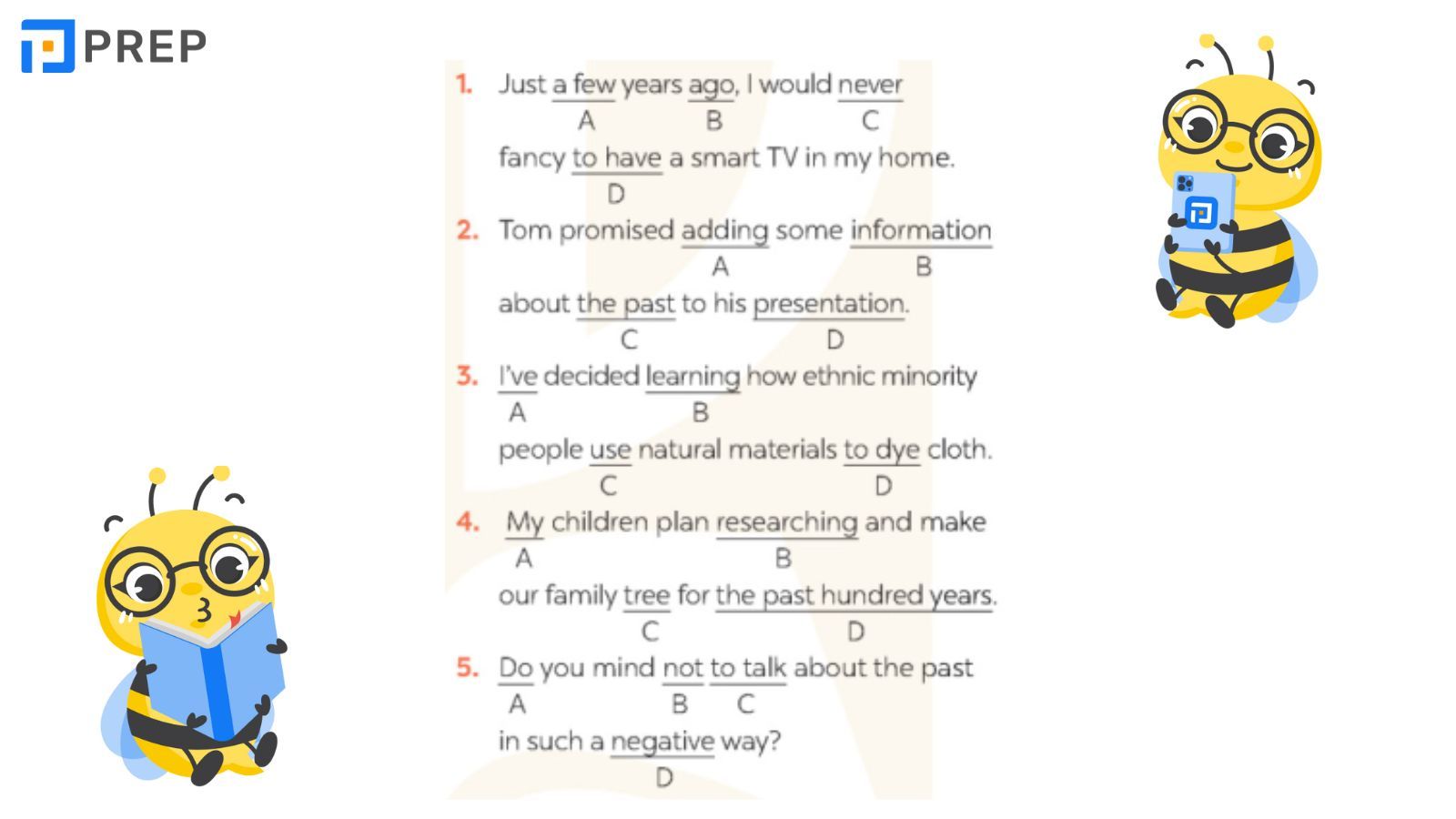
3.5. Work in pairs. Take turns to complete the sentences
Làm việc theo cặp. Lần lượt hoàn thành các câu.
1. For my future career, I want ___________________.
2. Do you mind not ___________________?
3. We all agreed ___________________.
4. I have never fancied ___________________.
5. For our two-day holiday, I suggest ___________________.
4. Communication
4.1. Listen and read the conversations
Nghe và đọc đoạn hội thoại. Hãy chú ý đến những phần được đánh dấu.
|
Bài nghe 1 |
Bài nghe 2 |
|
|
4.2. Work in pairs
Làm việc theo cặp. Đưa ra lời hứa cho các tình huống sau.
1. You are going out with friends. Promise your parents to return before 9 p.m. (Bạn đang đi chơi với bạn bè. Hãy hứa với bố mẹ bạn sẽ về trước 9 giờ tối.)
2. Promise your friend that you will be on time for the performance. (Hứa với bạn bè rằng bạn sẽ đến buổi biểu diễn đúng giờ.)
4.3. Read the passages about changes
Đọc đoạn văn về những thay đổi. Sau đó, hãy nối những người với chủ đề mà họ đang nói đến.
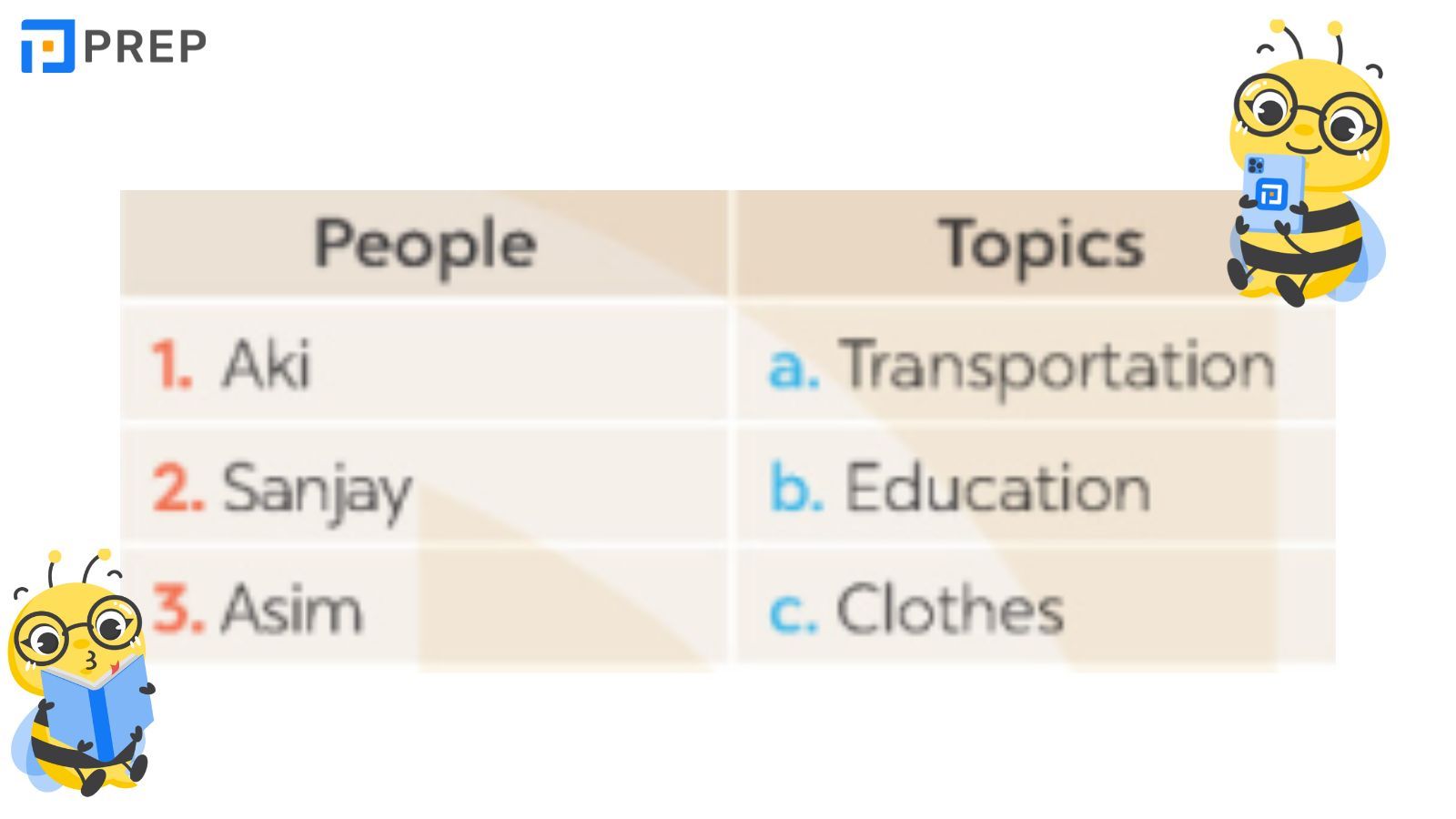
1. Aki from Tokyo
Children used to go to temple schools. Monks, samurai, doctors, and people of other professions served as teachers. Nowadays, children study in modern schools with teachers who get professional training in the subjects they teach.
2. Sanjay from New Delhi
Once, it was easy to say which country a person was from because people wore their own traditional costumes. Now, trends, comfort, and style are more important. More people are wearing western clothes like jeans and T-shirts instead.
3. Asim from Cairo
In the past, people used animals such as horses and camels for travelling. Now, airplanes, ships, and trains have replaced them. Transportation has become faster and easier.
4.4. Work in groups
Làm việc theo nhóm. Đọc lại đoạn văn ở phần 3 và thảo luận
1. What aspects of life in the past you want to experience. (bạn muốn trải nghiệm những khía cạnh nào của cuộc sống trong quá khứ.)
2. What change you think is for the better, and why. (sự thay đổi nào bạn nghĩ là tốt hơn và tại sao.)
4.5. Work in pairs
Làm việc theo cặp. Đọc danh sách dưới đây. Nói cho bạn của bạn biết điều gì trong số chúng vẫn giữ nguyên và điều gì đã thay đổi trong 5 năm qua. Ghi lại câu trả lời của bạn bè và báo cáo trước lớp.
5. Skills 1
5.1. Work in groups
Làm việc theo nhóm. Thảo luận xem mỗi cụm từ sau đây mô tả việc học tập trong quá khứ hay hiện tại.
-
Depending on textbooks (Phụ thuộc vào sách giáo khoa)
-
Using the Internet (Sử dụng Internet)
-
Learning under an oil lamp (Học bài dưới ánh đèn)
-
Being independent and active (Chủ động học bài)
5.2. Read the passages and choose the correct answer A, B, C, or D
Hai người thuộc các thế hệ khác nhau đang nói về phong cách học tập của họ. Đọc đoạn văn và chọn câu trả lời đúng A, B, C hoặc D.
Mr Nam, grandfather, a 70-year-old farmer
I was one of the few children in my village who was still at school at the age of 15. Every day, I got up early and walked to school. Learning then depended mostly on our teachers and textbooks. We had no library or lab. The nearest bookshop was six kilometres away. I learned simply by taking notes during class, memorising them, and doing the homework. Life then was simple. We rarely travelled outside our village, so we didn't know much about the world around us.
Mai, granddaughter, a 15-year-old student
Learning today is very different from my grandfather's time. It is easier and more convenient. Besides learning from teachers and textbooks, we use the Internet. It provides us with various online sources such as documents, clips, and programmes. Google helps us find the answers to almost any questions we have. The Internet also allows us to pursue our own interests. Learning has become more independent. Although most children in my village have fewer private learning facilities than the students in the city, we are still luckier than my grandfather's generation. We have TVs to watch at home and a library and computers at school.
Trả lời câu hỏi
1. In Mr Nam's time, __________.
-
A. teachers played an important role
-
B. there were no bookshops
-
C. students did experiments in labs
-
D. all children stayed on at school until they were 15
2. Few people travelled outside their village, so __________.
-
A. life in the village was simple
-
B. his school didn't have any learning facilities
-
C. the villagers didn't know much about the world around
-
D. none of the villagers knew about city life
3. Learning now __________.
-
A. does not require textbooks
-
B. uses some online programmes
-
C. depends only on the Internet
-
D. does not require students to take notes
4. The word "It" refers to __________.
-
A. learning today
-
B. my grandfather's time
-
C. learning facilities
-
D. the Internet
5. The word "we" refers to __________.
-
A. learning facilities
-
B. students at my grandfather's generation
-
C. students in the city
-
D. children in the village
5.3. Fill in each blank with ONE word from the passage
Điền vào mỗi chỗ trống MỘT từ trong đoạn văn.
1. Mr Nam learned mainly from teachers and _______.
2. He learned by _______ the information he got in class.
3. Nowadays, students can learn from _______ online sources.
4. An example of an online source is _______.
5. The Internet helps children _______ their interests.
5.4. Work in groups
Làm việc theo nhóm. Thảo luận và lập danh sách những thay đổi trong việc học tập của bạn trong 5 năm qua.
5.5. Share with the class the list your group has made in 4
Chia sẻ với cả lớp danh sách mà nhóm bạn đã lập ở phần 4.
6. Skills 2
6.1. Work in pairs. Choose the aspect(s) that you think will be mentioned in the talk
Bạn sắp nghe một bài nói chuyện về cuộc sống gia đình. Làm việc theo cặp. Chọn (các) khía cạnh mà bạn nghĩ sẽ được đề cập trong bài nói chuyện.
a. Family types
b. Parents' working places
c. Family holidays
d. Birthday parties
e. Parents-children relations
6.2. Listen to the talk and tick (✓) the correct column
Nghe bài nói và đánh dấu (✓) vào cột đúng.
|
Facts |
The past |
The present |
|
1. Popularity of extended families |
|
|
|
2. More holidays away from home |
|
|
|
3. More time spent doing things together |
|
|
|
4. More sources to learn from |
|
|
|
5. More democratic parent-children relationships |
|
|
6.3. Listen again and fill each blank with a word or a number
Nghe lại và điền vào mỗi chỗ trống một từ hoặc một số.
1. The speaker mentions _______ types of families.
2. In an extended family, there is/ are _______ generation(s) living together.
3. The speaker describes Vietnamese people as _______.
4. Children in the past usually came to their _______ to share their experiences.
5. Today's children want their parents to respect their independence and _______.
6.4. Read the list and tick (✓) the thing(s) that has/ have changed in your family in the past five years
Đọc danh sách và đánh dấu (✓) những điều đã/đã thay đổi trong gia đình bạn trong 5 năm qua. Ghi lại những điều đã thay đổi.
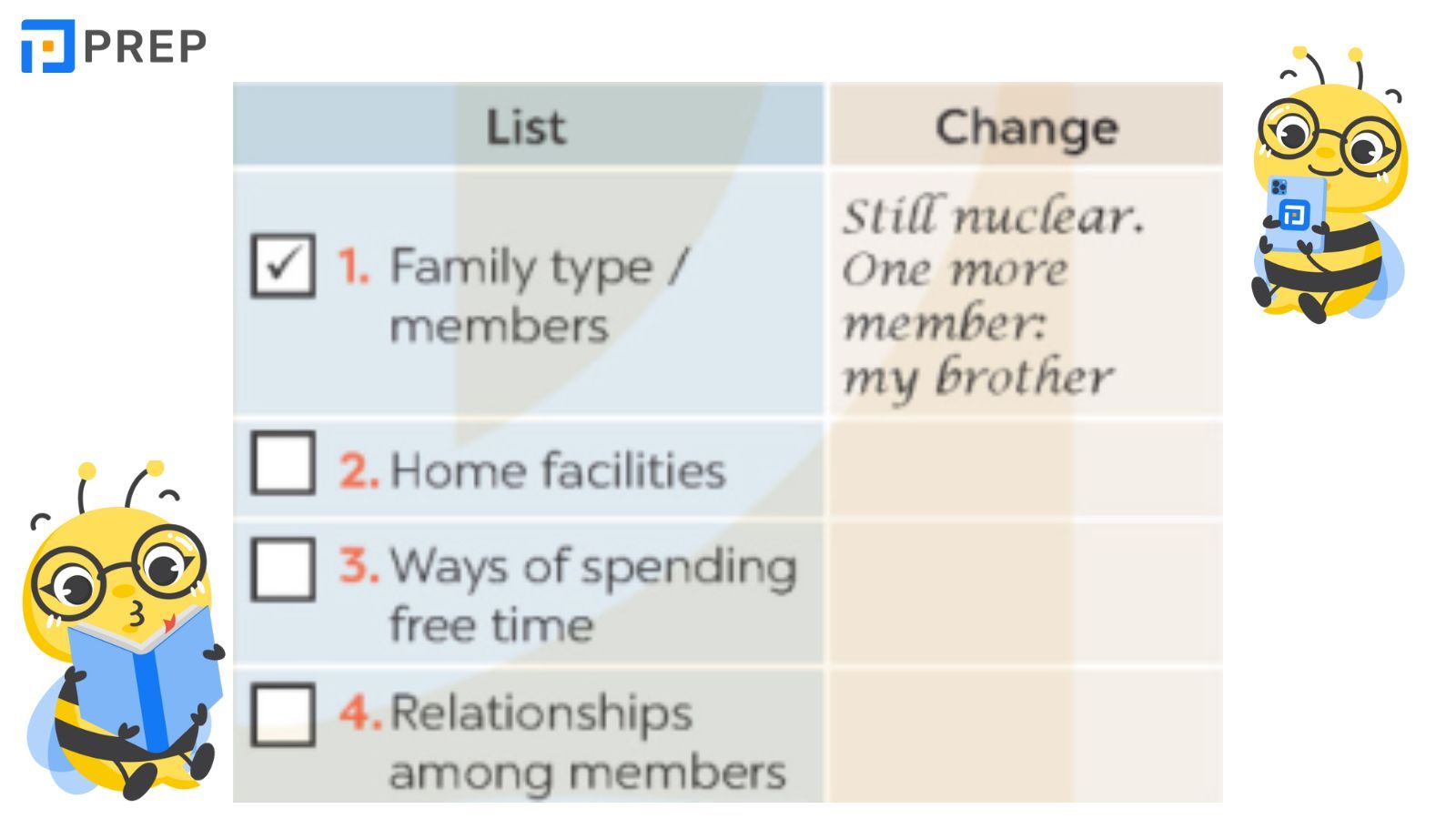
6.5. Write an email (100-120 words)
Viết một email (100-120 từ) cho người bạn qua thư về những thay đổi trong gia đình bạn. Sử dụng các ý tưởng ở phần 4.
7. Looking Back
7.1. Choose the correct answer A, B, C, or D to complete each sentence
Chọn đáp án đúng A, B, C hoặc D để hoàn thành mỗi câu.
1. I love animals and I'm determined to ______ my dream of becoming a vet.
-
A. have
-
B. pursue
-
C. do
-
D. depend on
2. ______ people tend to put the needs of their families ahead of their own.
-
A. Independent
-
B. Democratic
-
C. Kind
-
D. Family-oriented
3. Rapid changes in society and lifestyle have made the ______ in many families wider.
-
A. generation gap
-
B. family relation
-
C. family values
-
D. experiences
4. She has found ______ sources of information about life in Viet Nam a century ago.
-
A. extended
-
B. alive
-
C. various
-
D. long
5. Like adults, children sometimes want some ______.
-
A. opportunity
-
B. relations
-
C. values
-
D. privacy
7.2. Complete the sentences with the correct forms of the words in brackets
Hoàn thành câu với dạng đúng của từ trong ngoặc.
1. My parents taught me not to listen to other people's _______ conversations. (privacy)
2. It's amazing that the boy can _______ all the information in such a short time. (memory)
3. Living away from home to attend college has made me more _______. (independence)
4. In a modern society, we learn to value a person's _______. (free)
5. In a _______ classroom, every student has the right to speak as well as the responsibility to listen to others. (democracy)
7.3. Circle the correct words or phrases to complete the following sentences
Khoanh tròn những từ hoặc cụm từ đúng để hoàn thành những câu sau.
1. Do you mind turning / to turn the volume down? I'm studying.
2. We decided spending / to spend this whole week learning to cook traditional foods.
3. If you want seeing / to see the differences between the past and the present of a city, visit its museum.
4. He stayed in his room to avoid meeting / to meet his parents' guests.
5. My brother promised taking / to take me to the exhibition of traditional farming tools.
7.4. Make complete sentences from the clues
Viết câu hoàn chỉnh từ gợi ý. Thực hiện bất kỳ thay đổi nào và thêm nhiều từ hơn nếu cần thiết.
1. we / plan / visit / historical places / Cao Bang.
2. we / hope / have / bus station / near / village / soon.
3. even / grandmother /enjoy / use / Facebook / communicate / her friends.
4. last year / I / learn / make cakes / watch / cooking videos / Internet.
5. this morning / I / suggest / do a survey / northern women's traditional costumes.
8. Project
8.1. Interview one of your family members
Phỏng vấn một thành viên trong gia đình bạn về cuộc sống của họ khi bằng tuổi bạn bây giờ.
Take notes of his/her answers. You may focus on: (Ghi lại câu trả lời của anh ấy/cô ấy. Bạn có thể tập trung vào)
-
What school he/she went to (anh ấy/cô ấy đã học trường nào)
-
What learning was like then (việc học lúc đó như thế nào)
-
How he/she spent his / her free time (cách anh ấy/cô ấy sử dụng thời gian rảnh rỗi của mình)
-
What relations among family members were like then (mối quan hệ giữa các thành viên trong gia đình lúc đó như thế nào)
8.2. Make a poster
Làm một tấm áp phích, bao gồm ảnh của họ và những thông tin bạn đã ghi chú.
8.3. Present your poster to the class
Trình bày áp phích của bạn trước lớp.
IV. Đáp án bài tập tiếng Anh 9 Unit 6
Dưới đây PREP đã sưu tầm đáp án và lời giải gợi ý cho các bài tập trong tiếng Anh Unit 6, tham khảo ngay bạn nhé!
Trên đây PREP đã chia sẻ đầy đủ từ vựng, ngữ pháp, cấu trúc, kiến thức bài học và đáp án đi kèm trong tiếng Anh 9 Unit 6. Thường xuyên truy cập vào PREP để tham khảo thêm nhiều kiến thức tiếng Anh bổ ích bạn nhé!

Chào bạn! Mình là Hiền Hoàng, hiện đang đảm nhận vai trò quản trị nội dung sản phẩm tại Blog của website prepedu.com.
Với hơn 5 năm tự học các ngoại ngữ như tiếng Anh, tiếng Trung và ôn luyện một số kỳ thi IELTS, TOEIC, HSK, mình đã tự đúc rút được nhiều kinh nghiệm để hỗ trợ hàng nghìn người đang gặp khó khăn trong việc học ngoại ngữ. Hy vọng rằng những chia sẻ phía trên sẽ giúp ích cho bạn trong quá trình tự ôn luyện thi hiệu quả tại nhà!
Bình luận
Nội dung premium
Xem tất cảLộ trình cá nhân hoá
Có thể bạn quan tâm
Kết nối với Prep

MSDN: 0109817671.
Địa chỉ liên hệ: Tòa nhà Vinaconex, 34 Láng Hạ, phường Láng, TP Hà Nội.
Trung tâm CSKH tại HN: Lô 21 C2 Khu đô thị Nam Trung Yên, phường Yên Hòa, TP Hà Nội.
Trung tâm CSKH tại HCM: 288 Pasteur, Phường Xuân Hòa, TP Hồ Chí Minh
Trụ sở Công ty: Số nhà 20, ngách 234/35 đường Hoàng Quốc Việt, phường Nghĩa Đô, TP Hà Nội.
Phòng luyện ảo - Trải nghiệm thực tế - Công nghệ hàng đầu.
Hotline: 0931 42 8899.
Trụ sở Công ty: Số nhà 20, ngách 234/35 đường Hoàng Quốc Việt, phường Nghĩa Đô, TP Hà Nội.
Giấy chứng nhận hoạt động đào tạo, bồi dưỡng số 1309/QĐ-SGDĐT ngày 31 tháng 07 năm 2023 do Sở Giáo dục và Đào tạo Hà Nội cấp.





